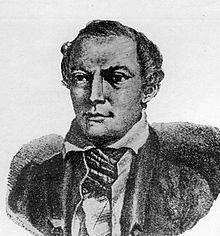Alexander von Oppeln-Bronikowski
Alexander August Ferdinand von Oppeln-Bronikowski ( pseudonym : A.Fd. von Oppeln, born February 28, 1784 in Dresden ; † January 21, 1834 ibid) was a Prussian and Polish military, German writer and writer of historical novels .
Life
Bronikowski came from the very branched German-Polish noble family Oppeln-Bronikowski , who were wealthy in Greater Poland , Neumark and West Prussia . His father Johann Peter Friedrich, married to Christine Karoline Wilhelmine von Thiele from an old Saxon noble family, owned a small estate in Greater Poland. At a young age he joined the Electoral Saxon army, during the Seven Years' War he was already a colonel in the Electoral Saxon Guard , after the end of the war he returned to Poland and was active in the Thorner Confederation of Polish Protestants . In 1769 he moved to Saxony and rejoined the Saxon army, where he gradually achieved the degree of adjutant general to the elector .
Alexander received his first lessons in his parents' home, his highly educated mother taught him a love of literature. At the age of 15 he joined the Prussian army as a junker and was initially stationed in Brieg , then, already as a lieutenant , in Erfurt , Warsaw (which then belonged to Prussia) and finally in Breslau . During his stay in Erfurt he founded a literary circle together with some officer colleagues interested in literature and published an almanac , where he published some poems.
After Prussia's defeat in the Battle of Jena , Bronikowski was released from the Prussian army and moved to Prague and later to Dresden. In 1809 he joined the army of the Duchy of Warsaw as a captain and took part, among other things, in Napoleon's Russian campaign in 1812, during which he was awarded the Knight of the Legion of Honor for his service .
After the fall of Napoleon, Bronikowski continued his military career, this time in the Army of Congress Poland , which he joined in 1815. In 1817 he was promoted to major and lived in Warsaw until 1823, where he maintained lively contacts with the local writers and improved his knowledge of the Polish language. In 1823 he asked to leave the Polish army, left Warsaw and returned to Dresden, where he lived (with a stopover in Halberstadt ) until his death in 1834. He was buried in the Johanniskirchhof ; his grave has not been preserved.
Alexander von Oppeln-Bronikowski made his debut in 1825 with a few stories that were published in the Dresdner Abend-Zeitung . In the same year, his first large, four-volume historical novel, Hippolyt Boratynski , was published, in which he described the fate of the Polish Queen Barbara Radziwiłł , wife of the last Jagellon King Sigismund II August . The novel became a great success and saw several reprints and translations into foreign languages. Before his death, Bronikowski wrote twenty historical novels, in which he dealt primarily with Polish history and legends . In his oeuvre he was under the influence of Walter Scott , but was more careful than the great Scot when it came to historical truth and details. Almost completely forgotten today, Bronikowski was one of the most widely read authors of the early 19th century and enjoyed European fame through translations of his works into most European languages.
Fonts (selection)
- Hippolyt Boratynski. (1825-1826)
- Casimir, the great Piast. (1826)
- The Gallic dungeon. Arnold, Dresden and Leipzig 1827. ( digitized first part ), ( second part )
- The castle on the Eber River. (1827)
- The Mouse Tower on Goplo Lake. (1827)
- The history of Poland from the earliest times to our days. Hilscher, Dresden 1827 ( digitized 1st ribbon ), ( second ribbon ), ( third ribbon ), ( fourth ribbon )
- The Grimmenstein. Narrative. (1828)
- Olgierd and Olga or Poles in the first century. 5 parts. (1828-1832)
- The women of Neidschütz. (1832)
- The women of Koniecpolski. (1832)
- Poland in the 17th century or John III. Sobiesky and his court. (1832)
- Fonts. Dresden and Leipzig 1825–1835, 21 volumes
- Collection of new fonts. Halberstadt 1829–1834, 28 volumes
literature
- Franz Schnorr von Carolsfeld: Oppeln, Alexander August Ferdinand von . In: Allgemeine Deutsche Biographie (ADB). Volume 3, Duncker & Humblot, Leipzig 1876, p. 355.
- German Literature Lexicon , Volume 2, Bern and Munich 1969
- Jerzy Kałążny, Fiction and History. Alexander von Oppeln-Bronikowski and his storytelling , Posen 1996
- Polski Słownik Biograficzny , Volume 2, Krakow 1936
Individual evidence
- ↑ The year of birth was given as 1783, about which Franz Schnorr von Carolsfeld noted almost a century later in the Allgemeine Deutsche Biographie that he was born in 1788 and that “[the] usual statement that he was born in 1783 [...] probably on one Printing errors [is] attributable. ” Friedrich-Wilhelm von Oppeln-Bronikowski, however, noted that Alexander did not know the exact year of his birth, but the baptism on March 2, 1784 in the baptismal register of the Dresden Kreuzkirche . See also Friedrich-Wilhelm von Oppeln-Bronikowski: Alexander von Oppeln-Bronikowski: a contemporary and a kindred spirit of Walter Scott . In: Joseph A. Kruse (Ed.): Heine yearbook 2009: 48th year . JB Metzler, Stuttgart, Weimar 2009, ISBN 978-3-476-02333-9 , pp. 175 f . ( limited preview in Google Book search).
- ↑ Klaus Hoffmann-Reicker : Who was Alexander von Oppeln-Bronikowski? In: Leipziger Volkszeitung , December 15, 2008, p. 18.
| personal data | |
|---|---|
| SURNAME | Oppeln-Bronikowski, Alexander von |
| ALTERNATIVE NAMES | Oppeln-Bronikowski, Alexander August Ferdinand von (full name); Opole, A.Fd. from (pseudonym) |
| BRIEF DESCRIPTION | Prussian and Polish officer and German writer |
| DATE OF BIRTH | February 28, 1784 |
| PLACE OF BIRTH | Dresden |
| DATE OF DEATH | January 21, 1834 |
| Place of death | Dresden |
